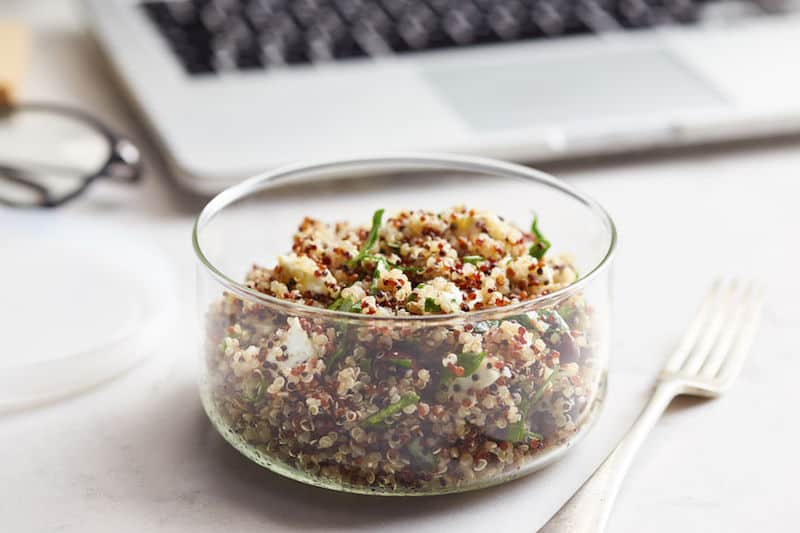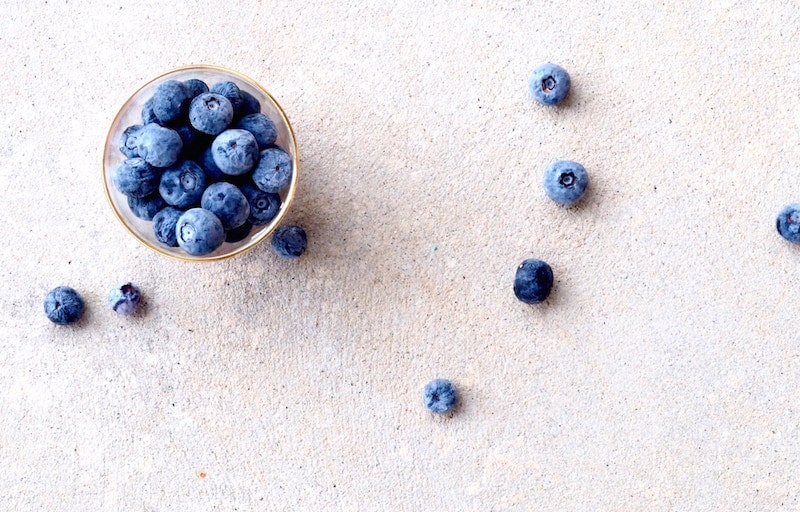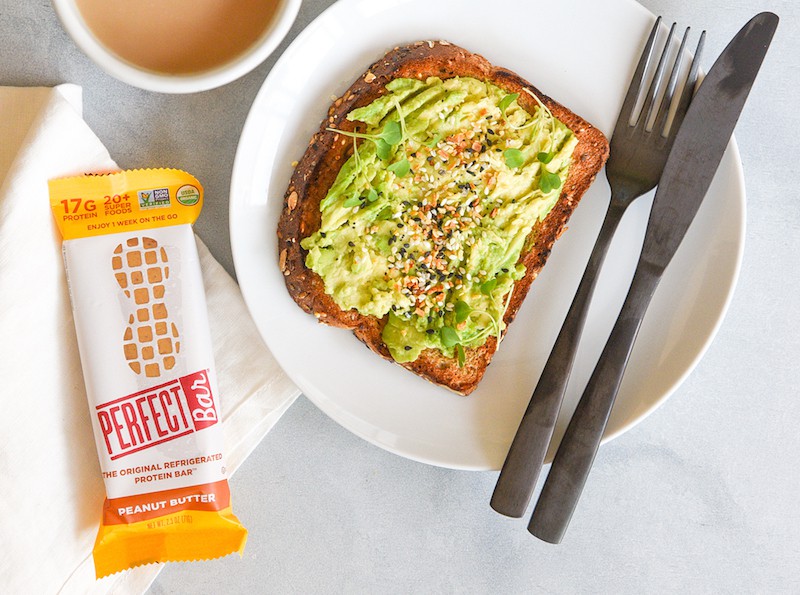It’s a Wednesday afternoon and your brain feels like it just skipped town. Problem is, you’ve still got three hours of work to do. Work that is dependent on using your head for more than a hat-rack. So, the question is: What are you going to do about it? When you think of workplace productivity tools, you likely don’t think of brain food. But since food is fuel, and fuel is what you need in the dog days of Wednesday afternoons, or any afternoon, maybe you should.
Eat More Fat to Fuel Your Brain & Increase Daily Productivity
When it comes to health and fats, the message you’ve been getting for years has been: Be afraid. Be very afraid. However, not all fats are created equally. And when it comes to your brain, the best thing you can do is take the standard FDA food pyramid and flip it on its head.
Fats can be broken down into two groups – saturated and unsaturated. Saturated fats include those found in butter, coconut oil, and dairy. While unsaturated fats are found in fish, nuts, seeds, and vegetable oils.
Healthy Vs. Not-So-Healthy Fats
The one fat you want to steer clear of is trans fats, which are added to processed foods, fast foods, and hydrogenated vegetable oils, mostly to extend shelf life. Vegetable oils, when heated, also contribute to free radical production in your brain, which can have negative cognitive effects.
You can further divide the unsaturated fats into monounsaturated and polyunsaturated, but we’re going to try to keep this as simple as we can. Once you go down the rabbit hole, finding your way back out can be tricky.
Healthy fats are essential for your health for many reasons, including their ability to help your body better absorb fat-soluble vitamins like A, D, E, and K – vitamins your brain needs to be at its best. Fats also provide you with a sustained source of energy, which has been known to increase productivity. Whereas sugar creates a spike, followed by the dreaded crash, healthy fats provide the kind of long-lasting energy needed to push through the afternoon doldrums.
If you’re wondering if consuming more fat will make you fat, the short answer is no. But, of course, remember everything is best in moderation and you can assume the complexity of the human body begs for a longer answer.
Be Pro-Antioxidants For Brain Health & Function, And To Reduce Inflammation
Besides specific nutrients and phytochemicals that are beneficial for brain health, any foods that increase blood flow, reduce inflammation, and provide high amounts of antioxidants will be great for your brain. Antioxidants are essential for combating free radicals and the oxidation they cause. Free radicals are unstable atoms, and the reason they’re unstable is that they’re missing an electron. This missing electron sends them on a thieving spree, as they attack healthy molecules in an attempt to steal their electrons, which is known as oxidation.
While this may sound like the plot of a bad action movie, it’s actually a normal biological function. However, when oxidation gets out of control, this chain reaction becomes too great and contributes to massive cellular death and destruction making your brain particularly vulnerable. Antioxidants are what keeps this destruction in check.
Inflammation is also normal, as this biological response to stress can help heal us when we’re sick. If you cut yourself, your body produces inflammatory cytokines to help repair that damage. What isn’t normal is chronic stress and chronic inflammation.
Unfortunately, most of us live in a state of chronic stress, which contributes to chronic inflammation. This type of inflammation is the foundation on which numerous conditions and diseases can build and grow, including those that negatively impact your cognitive abilities, as in memory, learning, and concentration. If you routinely experience brain fog, that is likely a sign of chronic inflammation.
The answer? Feed your brain with foods it loves (and needs). Eat more protein and healthy fats to stay focused, clear-headed and fueled for the day.

Eat More Protein And Say Yes to Amino Acids to Fuel Your Brain
Protein is another superstar when it comes to powered-up brain food. While your brain and its neurons are mostly made of fat, they communicate via proteins. This communication is vital, as miscommunication essentially diminishes brain function, and can cause problems anywhere in your body.
Your brain communicates through chemical messengers known as neurotransmitters, which are made of amino acids. You may recall from 6th-grade science class that amino acids are the building blocks of protein.
After you ingest proteins and they’re broken down, the amino acids in them are left behind. These amino acids perform essential functions in the body, including building more protein. A complete protein source is one that includes all eight essential amino acids:
- Valine
- Lysine
- Threonine
- Leucine
- Isoleucine
- Tryptophan
- Phenylalanine
- Methionine
The Nitty Gritty Of Amino Acids
Your body cannot store these amino acids, so it’s important to get them through food. If you don’t get them together, your body will break them down and use them for energy. When you do get them together, they build more proteins which go toward growth and repair. Re: the goal.
Another important amino acid that isn’t listed is tyrosine which you get from eating animal products including eggs, and nuts and seeds. Tyrosine helps your brain manufacture the neurotransmitters epinephrine, norepinephrine, and dopamine, all of which help you feel more energized, alert, and contribute to a greater sense of wellbeing.
When you eat adequate amounts of good protein combined with healthy fats (like Perfect Bar!) your brain cells multiply and your brain function is optimized. Whereas, when you eat processed foods with artificial ingredients and loads of sugar, this has the opposite effect on your brain. Lesser quality brain food can have negative effects on your brain function. Makes sense, right?
This 1999 study on cognitive performance, stress, and brain function found that tryptophan was, “essential for optimal brain function and cognitive performance,” as more of this amino acid contributed to better brain function, while less of it reduced brain function. Researchers also added that low levels of tryptophan can cause depression, which can also decrease workplace productivity.
That same study found that tyrosine, in particular, “has been shown to prevent some of the adverse neurochemical and behavioral effects of exposure to stress.” This is important as most of us routinely deal with chronic stress. And stress is one sure-fire way to kill productivity.
This recently conducted study out of Australia shows a pretty remarkable correlation between Alzheimer’s disease and protein consumption. Of the 541 participants in the study, those that consumed the most protein per day (118 grams) had lower levels of amyloid beta – a precursor to the disease. While those who ate the least amount of protein (54 grams) were 12 times more likely to develop Alzheimer’s.
Consider how you feel after eating certain foods. When you eat a high-sugar snack during the day, what effect does that have on you? Do you feel that spike and subsequent crash? (Hence, the importance of low GI foods) How about a high-carb snack? Do you feel sluggish afterward? And then there’s protein, which if you’re paying attention to your body, should help you feel more alert and focused.
The Link Between Diet and Productivity
Eating the wrong foods during your workday can seriously impair productivity. But so can eating too much food.
Your body uses a lot of energy during the digestive process. Which means if you eat a large meal at lunchtime, you’ll have less energy to do your job. This helps to explain that post-lunch brain fog, and the post-Thanksgiving feast coma many of us have fallen prey to.
The same thing happens when you consume a high-carb meal, as too many carbohydrates result in your body producing an excess of insulin. This floods your brain with sleep hormones and drains your energy reserves. While high-protein meals result in much less insulin production. And therefore, help to keep your energy levels high.
At this point you may be wondering if I skip lunch, won’t I avoid these problems? Not really. When we’re hungry, we tend to get irritable, which gets in the way of work. But we also have trouble focusing. Ignoring a stomach that’s rumbling in protest is no easy task. And then there’s the issue of low blood sugar.
Having the right amount of glucose in your blood is key. Having too little or too much will result in the same sluggish feelings and performance. According to researchers, about 25 grams is just right for your brain to perform at its best. They go on to recommend, “smaller food portions with the appropriate nutrients seem to be beneficial for the brain’s molecules.”
What About Caffeine?
Caffeine, for most people and when consumed in reasonable amounts, has shown very positive effects on workplace productivity. But there’s a point when it starts to produce diminishing returns.
There are hundreds of studies that show caffeine’s ability to improve memory, cognition, and performance. Caffeine makes you more alert and focused and can give you a much-needed energy boost. And there are even health benefits you get from drinking coffee, including a reduction in inflammation, which improves brain function.
Caffeine stimulates your body’s production of adrenaline – the fight or flight chemical. A little adrenaline and you feel energized. Too much adrenaline and you’ll likely feel like a jittery, restless mess. And if you’re in that heightened state too long, you’ll wish you were only dealing with a sugar crash, as the burn-out that follows can be mentally and physically debilitating.
Besides finding the sweet spot in terms of the amount of coffee you consume, timing is another critical factor. If your coffee consumption is limited to mornings, you’ll be fine. But if you’re drinking coffee into the late afternoon, this can disrupt sleep quality, and poor sleep will certainly limit your productivity at work.
Eat Less, Consume More
The key is in eating less while consuming more nutrients. After all, your brain doesn’t care much about calories; at least not enough to be counting them, as we tend to do. But it does care about the nutrients your feeding it.
Which means your best productivity tools will be these power foods for the brain. One thing to keep in mind is this: What works for one, may not work for all. You are all somewhat biologically unique. The important thing is to find what brain food work best for you.
Brain Food — The Super Variations
1. Blueberries
All berries are high in antioxidants, but the blue ones are the best of the bunch. They’re loaded with antioxidants, meaning they’ll battle those pesky free radicals that cause oxidation. Numerous studies have shown their ability to improve memory. And the high gallic acid content in blueberries will help protect your brain from degeneration and stress.
2. Avocados
Avocados are very high in fat, which scares some people away. But do you know what else is high in fat? Your brain – as in 60% fat. Avocados are loaded with monounsaturated fats, which help improve blood flow. They’ve also shown the ability to prevent blood clots in the brain, thanks to high amounts of vitamin K and folate.
3. Dark Chocolate
The flavonol compounds in dark chocolate also improve blood flow by enhancing the widening of blood vessels. These same compounds have been shown to enhance learning, focus, and memory. Dark chocolate is also high in antioxidants and has great anti-inflammatory effects.
4. Eggs
Eggs are very high in choline, which is particularly great for developing brains. They’re also a fantastic source of high-quality protein. And if you’re concerned about cholesterol, the kind you get in pastured, organic eggs is the good kind (HDL) which also has numerous brain benefits.
5. Walnuts
In a 2015 study involving thousands of participants, those who consumed a handful of walnuts each day scored better on six cognitive tests. Memory, concentration, and brain-processing speeds were all better for those who consumed them. Walnuts are very high in protein and omega-3s (ALA), much more so than other nuts.
6. Salmon and Sardines
Perhaps the best brain food you can consume, these cold-water, fatty fish are high in protein and omega-3s, particularly the brain-boosting type – DHA. They’re also high in brain nutrients – vitamin D, B12, and folate – and have shown an ability to improve focus and even prevent ADHD. Our bodies don’t produce omega-3s, so it’s especially important to choose foods with high amounts.
7. Olive Oil
Extra virgin olive oil is high in antioxidants, particularly polyphenols. These types of antioxidants have been shown to improve memory and learning. Olive oil has also gained attention in recent years as a potent weapon against Alzheimer’s disease. But make sure to consume your olive oil raw. Heating it will cause the oxidation you’re trying to combat.
8. Coconut Oil
There are a number of healthy nut and seed oils – sesame, flax, sunflower, pumpkin – but coconut oil may be the real star of the bunch. It’s super-high in healthy saturated fats that provide quick energy for your brain. It’s a strong anti-inflammatory. And it helps in destroying the bad bacteria in your gut, also known as your second brain, and contributes to better cognitive function thanks to improving the gut-brain axis.
9. Celery
Celery embodies everything we want from our new and improved nutrition plan – low in calories, but nutritionally dense. It’s only 16 grams per cup but contains a whopping amount of vitamins and minerals and is a natural anti-inflammatory. And it contains a special compound – luteolin – which has shown great promise to relieve brain inflammation and the fog it causes.
10. Leafy Greens
If it’s good enough for Popeye and his bulging forearms, it’s probably good enough for you, too. However, it’s the brain-boosting powers of greens that really set them apart. They’re high in vitamins A and K, especially kale for the latter hard-to-get nutrient, which is great for reducing inflammation. And according to one large study, they’re great at slowing mental deterioration as we age.
This list isn’t complete or in any particular order. The one thing all these foods have in common is that they are nutritionally dense. Many of them are high in fat and protein. And for those that are not, you’ll get many more benefits from them by combining them with fats and proteins. Balanced is the word that comes to mind.
Putting it All Together
Let’s quickly look at a few takeaways on the marriage between workplace productivity and brain food:
- You are what you eat, even at work
- Your brain loves healthy fat and protein
- Carbs and sugar are productivity-killers
- Too much caffeine is too much
- Focus on nutrients, not calories
Try putting together a list of foods or snacks you can enjoy during work – Perfect Bar, seeds, nuts, hard-boiled eggs, smoked salmon, cans of sardines (yes, some people enjoy sardines), celery with nut butter, fruit and yogurt, leafy green salad with olive oil, anything that satisfies our requirements for improving workplace productivity through food. Work toward the combination of the following four:
1. High fat
2. High protein
3. Whole foods (not processed)
4. Nutritionally dense, as in superfoods
Now, back to our dilemma: It’s Wednesday afternoon and your brain just flew the coop, like Jack Nicholson in One Flew Over the Cuckoo’s Nest. What are you going to do?
Coffee? Some other, much-less-natural, caffeine alternative? Suffer through it?
Well, for today, maybe you don’t have much of a choice. But for every day moving forward, you certainly do. The trick to being mentally sharp and productive at work will depend on your food choices and food prep. And the trick to sticking with that plan will always rely on convenience. So keep protein snacks at your desk, ask your office manager if you can keep the shared kitchen stocked with easy, healthy snacks like fruit, veggies, hummus, and Perfect Bar.
Interested in bringing Perfect Bar into your workplace?
We have just the thing: The Perfect Bar Wholesale Program! Learn more about our Wholesale Program and keep your co-workers, employees, and friends happy and full — their brains will thank you too!
Learn More About Our Wholesale Program






What an amazing article! So informative. The best I’ve read when covering the how and why we need to eat certain ways to fuel our bodies!
Thank you! My hubby and I discovered these bars about 5 months ago and now incorporate 1 a day and feel better thru the morning until lunch or as lunch to fuel me until dinner without a ‘food coma’ feeling.
Thank you again!
Loyal fans,
Crystal and Danny Pipher
Great article ~ always good to read up on ways to care for our “aging” bodies and brain health. Perfect Bars are a staple in our refrigerator and we love the variety of flavors.
Pumpkin Bars get in my belly : )
For the Health of it!
Joseph and Katie Freeno
I love these bars. They give energy and they are delicious. I’ve tried all flavors are all good but the almond is my favorite.
The Almond Butter Perfect Bar is, most definitely, a great favorite to have! Thanks for being a fan, Carisa!
I always suffer from the afternoon SLUMP. This article is so informative and helpful! Thank you!
Hi Roni – Got to fuel the brain and body to avoid that mid-day slump!
Used to love Perfect Bars. I can not eat dairy products now at all due to having the alpha gal syndrome from a tic bite. I miss the bars terribly. Wish there was a non dairy one, and lower sugar content. I am only allowed chicken, turkey and fish. And of course veggies. I get my protein fix in the am with a plant based protein powder smoothie I’ve made for years. I do miss the bars for snacks.